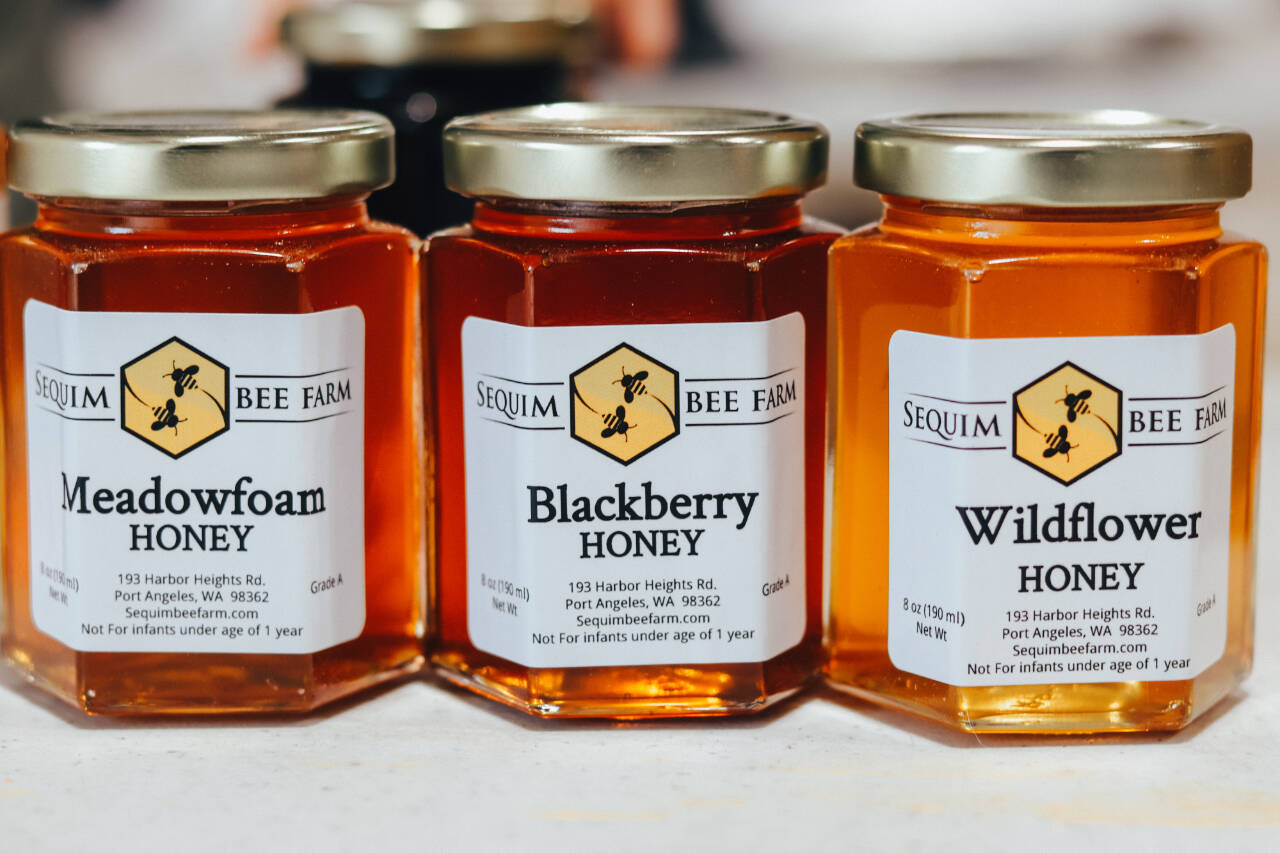“It’s all about the bees,” says Meg Depew of Sequim Bee Farm. It’s rainy when I arrive at the Sequim Bee Farm owned by Meg and Buddy Depew. Meg and Buddy have been beekeeping since 2014. Not only are they regular vendors at the market Saturdays, but their honey has gone on to win several national awards.
Pairing the honey with the right tea, coffee or sauce is a science and an art. Meg lines up several types of honey for me to try. The colors of the different honey make a rich ombre of light gold to deep amber.
Each honey is completely different in flavor, unique to the nectar of the plants the bees have collected.
To get such unique flavors, Meg and Buddy currently manage more than 65 hives spread across Clallam County.
“You won’t use that with green tea, but it stands up nicely to coffee,” Meg says, laughing, as I try the Buckwheat, which has a robust molasses flavor.
“I talk to people all the time about what they’re using the honey for.”
The Meadowfoam Honey, with its creamy notes of vanilla and crème brûlée, is a crowd favorite. Meg says it’s popular with kids, who often describe it as tasting like a marshmallow. She likes to hand out honey sticks to the kids visiting the market and remind customers to take good care of the bees.
“The farmers depend on them because they’re pollinating the crops that are being grown,” she says.
Bees bolstering ag businesses
Bees are a vital building block to our agricultural system. Reportedly, bees contribute more than $14 billion dollars worth of value to the U.S. agriculture industry yearly.
Pollination directly impacts the size of crop yields. This in turn affects the amount and value of farm products available to consumers.
Given the rain outside and the unusually long, cold spring, we discuss the ill effects of the weather on the bees. Meg recounts the high number of bee deaths last spring, with its similar unusual weather patterns to this year.
Prolonged winters that prevent bees from leaving the hive are dangerous; the hive may not have enough winter food reserves to sustain itself through the extended period of coldness. As climates continue to rapidly change, it’s hard to predict how bee populations will adapt to survive new environmental conditions.
Given the mutual dependence between bees and human food sources, Meg stresses the importance of supporting pollinator populations in order to support our own.
“Bees are an integral part of the circle of life,” she says.
Protecting the bees is a community effort. But one doesn’t need to be a beekeeper in order to help sustain bee populations. Meg recommends many measures that can be taken in your own yard, such as diversifying the lawn, planting pollinator friendly plants, and reducing pesticide and chemical usage. Dandelions are a particularly important food source for bees in the early spring.
Meg also recommends that if you find a swarm on your property, call the non-emergency line. Our local police force can connect you with local beekeepers like the Depews!
Support pollinator friendly business, and catch up with Sequim Bee Farm on Saturdays at the Sequim Farmers and Artisans Market. Not only can you grab their award-winning honey and get some pro honey pairing tips from Meg, but ask her about what you can do to help save the bees.
Bailey Loveless is the director for the Sequim Farmers & Artisans Market. See sequimmarket.com.
Sequim Farmers & Artisans Market
Open: 9 a.m.-2 p.m. Saturdays through Oct. 29
Location: Sequim Civic Center Plaza and Centennial Place, downtown Sequim
More info: director@sequimmarket.com, 360-582-6218
On the web: sequimmarket.com



